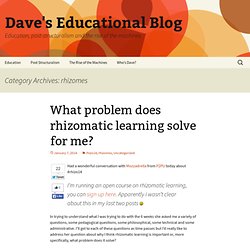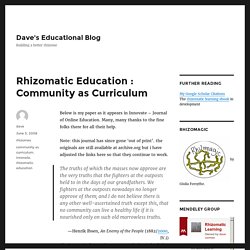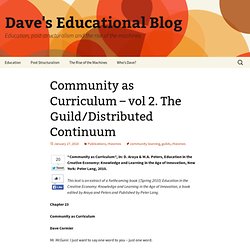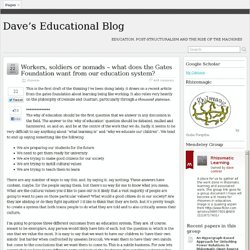

Category » rhizomes « @ Dave’s Educational Blog. People used to make records As in a record of an event The event of people playing music in a room - Ani Difranco I had a awesome conversation last week with a colleague at UPEI.

We talked a bit about a new course she’s putting together, a bit about the course that I teach in the same program and, more broadly, about education. She’d been kind enough to come and watch a presentation I’d given on campus and had mentioned that the ‘history of knowledge’ piece that I did at the start of my presentation was the missing piece that gave her better insight into what I’ve been talking about with rhizomatic learning. I realized that I have never actually blogged the piece: it’s something that has developed over the last year, entirely in my presentations. Note: This is a snapshot of the change of knowing in the Greco-Roman tradition. In the Beginning Was The Odyssey When I think about knowing and how it’s changed, I like to think about The Odyssey.
What it meant to know, in this case, was TO DO. Rhizomatic Education : Community as Curriculum. Below is my paper as it appears in Innovate – Journal of Online Education.

Many, many thanks to the fine folks there for all their help. Note: this journal has since gone ‘out of print’. the originals are still available at archive.org but i have adjusted the links here so that they continue to work. The truths of which the masses now approve are the very truths that the fighters at the outposts held to in the days of our grandfathers. We fighters at the outposts nowadays no longer approve of them; and I do not believe there is any other well-ascertained truth except this, that no community can live a healthy life if it is nourished only on such old marrowless truths. —Henrik Ibsen, An Enemy of the People (1882/2000, IV.i) Knowledge as negotiation is not an entirely new concept in educational circles; social contructivist and connectivist pedagogies, for instance, are centered on the process of negotiation as a learning process.
On Knowledge Information is the foundation of knowledge. Community as Curriculum – vol 2. The Guild/Distributed Continuum. “Community as Curriculum“, in: D.

Araya & M.A. Peters, Education in the Creative Economy: Knowledge and Learning in the Age of Innovation, New York: Peter Lang, 2010. This text is an extract of a forthcoming book ((Spring 2010) Education in the Creative Economy: Knowledge and Learning in the Age of Innovation, a book edited by Araya and Peters and Published by Peter Lang.Chapter 23 Community as CurriculumDave Cormier Mr. Ben: Yes sir. Mr. Ben: Yes I am. Mr. Ben: Exactly how do you mean? Mr. Ben: Yes I will. Mr. —The Graduate, 1967. Workers, soldiers or nomads – what does the Gates Foundation want from our education system?
This is the first draft of the thinking I’ve been doing lately, it draws on a recent article from the gates foundation about learning being like working.

It also relies very heavily on the philosophy of Deleuze and Guattari, particularly through . The why of education should be the first question that we answer in any discussion in the field. The answer to the ‘why of education’ question should be debated, mulled and hammered, on and on, and be at the centre of the work that we do. Sadly, it seems to be very difficult to say anything about “what learning is” and “why we educate our children”. We tend to end up saying something like the following We are preparing our students for the future We need to get them ready for university We are trying to make good citizens for our society We are trying to instill cultural values We are trying to teach them to learn There are any number of ways to say this, and, by saying it, say nothing. The worker is easy to measure. Soldiers defend the status quo.